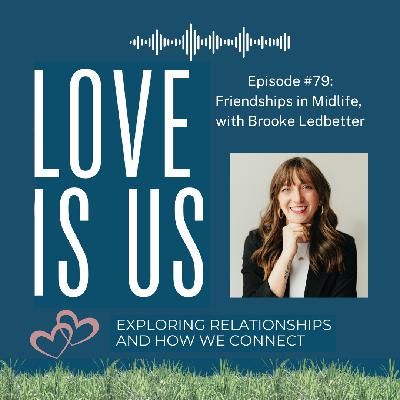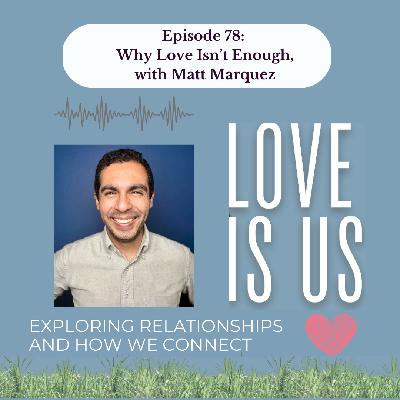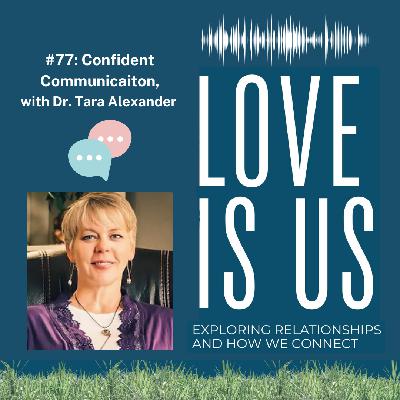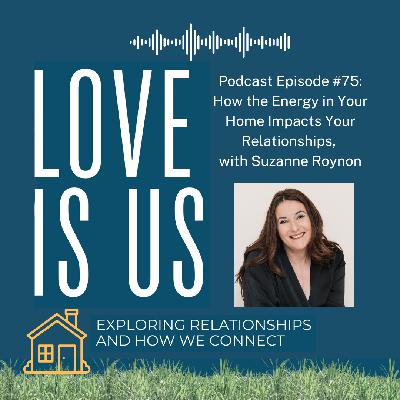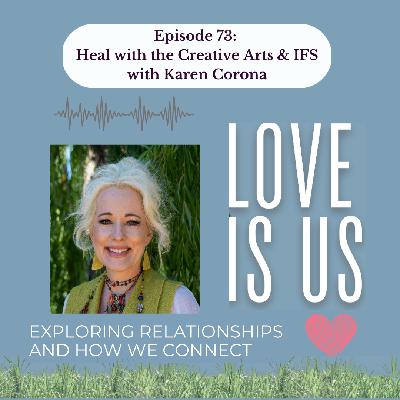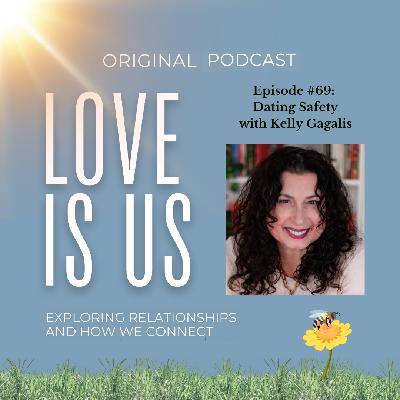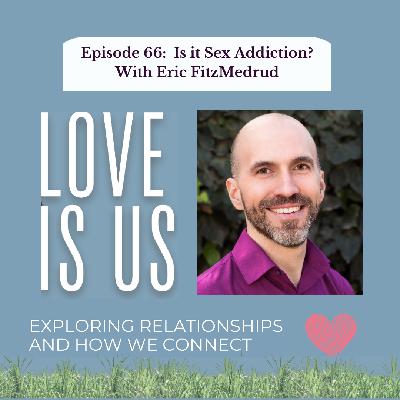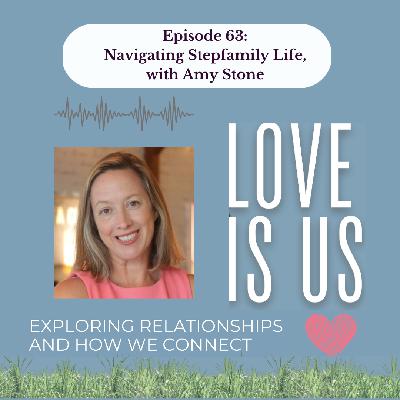#68: Inside Out 2: Four Lessons for Emotional Growth
Description
Have you been hearing the buzz about the latest Inside Out movie? It's not just for kids! In fact, there are some important lessons we can all learn from it about our emotional world and how that impacts our behavior and relationships. Today I talk about 4 of those lessons (plus a bonus) that resonated with me.
Learn more about Karin:
Website: https://www.drcalde.com
Instagram: https://www.instagram.com/theloveandconnectioncoach/
TRANSCRIPT
Intro:
Karin: This is Love Is Us, Exploring Relationships and How We Connect. I'm your host, Karin Calde. I'll talk with people about how we can strengthen our relationships, explore who we are in those relationships, and experience a greater sense of love and connection with those around us, including ourselves. I have a PhD in clinical Psychology, practiced as a psychologist resident, and after diving into my own healing work, I went back to school and became a coach, helping individuals and couples with their relationships and personal growth. If you want to experience more love in your life and contribute to healing the disconnect so prevalent in our world today, you're in the right place. Welcome to Love Is Us.
Episode:
[00:49 ] Karin: Hello, everybody, and welcome. Today I'm going to be talking about inside out two. And unless you've been living in a cave, you probably know that that recently came out. I saw it with my husband last weekend. No kids, just us. And I absolutely loved it and he really appreciated it, too.
I loved the first one that came out in 2015. I think I've seen it maybe three times, and the last time I watched it, I just bawled my eyes out. So I was really expecting to cry during this one, but I didn't. I got maybe a little teary. And I've heard other people have really lost it while watching this because it really touches something in them. They recognize themselves in the movie, which is powerful. I mean, it's not that it's necessarily a sad movie, and in fact, there's a lot of really clever humor and so there are lots of opportunities to laugh. It's because they really get to the heart of anxiety and what it feels like to have it. That's the theme of this second one. Therapists, coaches love this movie because they nail it. They really do get it right. They really help you understand how your mind works, why you do the things you do, why you are the way you are. So if you're listening to this podcast, you might enjoy it, too. But then, of course, kids like it, their parents like it, so it speaks to a wide, wide audience.
I am going to give away some parts of the movie, so you might want to see it first before listening to this. I'm not going to be talking about the plot in general. I'm just going to be talking about certain aspects of it. But there are some spoilers, so just be aware of that. And I'm going to be talking about the first movie and the second movie because I think when taken together, it really gives us such a rich picture of the human mind and human behavior, human emotions. So I'm going to be giving four lessons today, and I could be talking about 20, probably, from the movie. There's just so much in there, but I'm going to focus on four plus a bonus, one that I thought came through in the movie, but isn't necessarily hit you over the head obvious.
So, for a little background, the different parts of Riley, who is a pre teen and is the star of the animated Pixar movie, Inside Out. These parts are portrayed as these extreme little personalities that embody different emotions. There's joy, sadness, fear, and disgust. I think I'm getting that right. And all of these emotions are parts of Riley, and they all do something for her. They're all important. And so this is the first lesson. And that is, we are made up of a range of different parts that feel a range of different emotions. And if we try to suppress the ones that we don't like, then we're also going to be dulling the rest of our emotions. We are human beings, and we are meant to feel the full range of emotions. And suppressing one hard emotion might seem like a good idea, because why would you want to feel that? Why would you want to feel sad? Why would you want to feel angry? The things that we tend to not to not really value or appreciate or really enjoy. But the thing is, is that it doesn't work very well. It ends up prolonging our suffering when we push things down, because it's going to keep trying to push through. And also the feelings will come out in ways that we don't necessarily expect or appreciate. And it might come through at times when it's really not convenient. But if you can just allow yourself to feel those hard emotions, that's the fastest way through. And you will get to the other side if you allow yourself to feel. And I really think that was the main theme of their first movie, because Riley is struggling with something that is happening in her life. And she has this predominant part that feels joy, and she likes that part. And yet, when Joy tries to suppress sadness, it just ends up making things worse for her. And when finally she can tap into that sadness, that enables her to then reconnect with joy. And also when she suppresses sadness, it also cuts her off from other parts of herself. And that is really sad. So allow yourself to feel all of your emotions. That's lesson number one.
So lesson number two is also largely from that first movie and is related to this first one. And that is, is that we all have these, you know, what they call islands in the movie. So, for Riley, in the movie, she has a family island friend island. There's honesty, and there's goofball islands. And all of these islands are part of her. They anchor her to who, and they all help her to feel good, to be alive. You know, when I work with anyone, but especially my couples, I really encourage them to develop themselves, to have their own interests, to have their own connect with their own wants and needs, to develop their own friendships, to do the things that they really love to do, to find what lights them up. So it's not just about your long term relationship. It's important. Well, to diversify and to have different things in your life and to not just. Or to not just work. It's really good and healthy to have all these things. You know, maybe you make friends or have a hobby you love, you volunteer, you exercise, and maybe you don't have time for all of that, but make sure you have activities and qualities about yourself that you appreciate. So these so called islands can help anchor you in hard times and also help you enjoy life. And when one thing ends up going away, so maybe a relationship ends, maybe a job comes to an end, you will have other things in your life that will buoy you and light you up. They will help you get through those hard times. Okay, so that's lesson number two.
Lesson number three comes from the second movie. Somewhere in the middle of the movie, we come to Riley's imagination. And imagination is a beautiful, wonderful thing. But when it is paired with strong emotions, like anxiety, or maybe grief or anger or envy or another strong emotion, it can end up feeding that underlying strong emotion and make it bigger. And another way that I talk about this with my clients is the stories that you tell yourself when you are triggered by that strong emotion, and that ends up eating that emotion and making things a lot bigger. And it can make it more difficult to keep your perspective and see things for what they really are. You know, I talk about this a lot with couples because this is exactly what so commonly gets couples into trouble, is that, you know, one person does something that triggers the other one. And then the one that's feeling triggered or activated, they start telling themselves these stories, and then it makes it bigger and bigger, and then that can end up triggering the other person. And so they start telling themselves stories, and suddenly you are so far from what originally happened that it makes it harder to deal with that underlying trigger. So, for example, one person makes a big purchase and doesn't tell the other one their partner notices it while looking at their bank account and might not even know what it is, but you can't believe they didn't tell you or check with you. And so you start telling yourself some stories. Maybe you start making things up about what it is that they purchased. Or maybe you start thinking that, oh, my gosh, maybe they're cheating on me and they bought something for somebody else, or they've got this secret life. And then you start thinking about all the ways that you're really not compatible with this person and all you think about all their flaws, and you can see that it just builds on itself, the reality. They made a big purchase and they didn't tell you. That's all you know for sure. Are you allowed to be angry about that? Of course. So feel those emotions. Allow yourself to feel that and then have a conversation. That anger is trying to protect you, so listen to it, but don't feed it. You know, have that conversation. Check in with them before you go down that road of demonizing them. Your partner probably crossed a boundary. They made a mistake. But have a conversation. Let them know how it made you feel, and then talk about what you need going forward. And then liste


